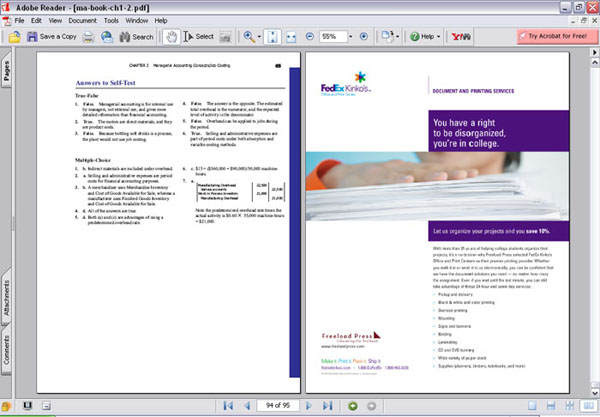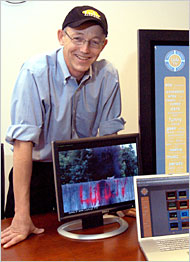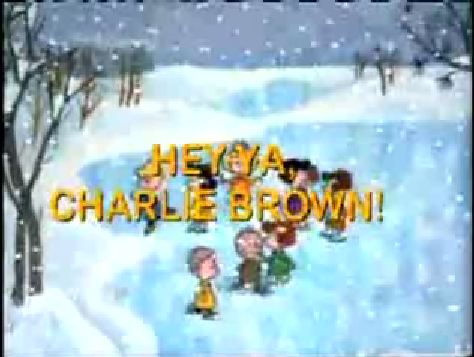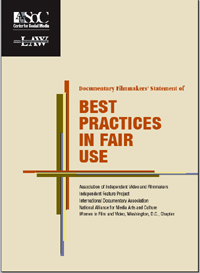Ben’s post about the failure of ebook hardware to improve reading as handily as ipods may have improved listening has generated some interesting discussion. i was particularly taken by one of the comments — by Sebastian Mary and wrote her some fan mail:
To:Seb M
From: bob stein
Subject: bit of fan mail
hello,
i thought your comment on if:book this morning was very perceptive, although i find myself not sure if you are saddened or gladdened by the changes you forsee. we are quite interested in collaborations with writers who are poking around at the edges of what is possible in the networked landscape. next time you’re in the states, come visit us in williamsburg.
b.
to which i got a deliciously thinky response:
Hi Bob
Many thanks for your message!
I’m likewise interested in collaborations with writers who are poking around in what’s possible in the networked landscape.
And in answer to your implicit question, I’m both saddened and gladdened by the networked death (or uploading) of the Author. I’m saddened, because part of me wishes I could have got in on the game when it was still fresh. I’m gladdened, because there’s a whole new field of language out there to be explored.
I’m always dodging questions from people who want to know why, if I’m avoiding the rat race in order to concentrate on my writing, I’m not sending substandard manuscripts to indifferent publishers twice a year. The answer is that I feel that in an era of wikis, ebooks, RSS feeds and the like, to be trying to gain recognition by copyrighting and snail-print-publishing my words would be a clear case of failing to walk the walk. It’s like Microsoft versus Linux, really, on a memetic level. And I’m a firm believer in open source.
So what would writers do, if they can’t copyright themselves? What do I do, if I don’t copyright myself? We don’t live in an era of patrons any more, after all – and we’ve got to pay the rent.
But I don’t think, if we’re giving up on the industrial model of what a writer is (the Author, in the Barthesian sense) that we have to go back to the Ben Jonson model of aristocratic patronage. Rather, I’d advocate moving to a Web2.0 model of what writers do. Web2.0 companies don’t sell software: they provide a service, and profit from the database that accrues as a byproduct of their service reaching critical mass. So if, as a writer, I provide a service, perhaps I can profit from the deeper insights that providing that service gives me.
So what does that look and feel like, in practice? It’s certainly not the same as being a copywriter or copy-editor. It means learning to write collaboratively, or sufficiently accessibly that others can work with your words. It’s as creative as it is self-effacing, and loses none of its power for being un-branded in the ‘authorial’ byline sense. In the semiotic white noise of an all-ways-self-publishing Web, people who can identify points of shared reference and use them to explain less easily communicable concepts (Greek-style rhetoricians brought up to date, if you will) are highly in demand.
I think writing experienced a split. I’d situate it in the first half of the 18th century, when the print industry was getting into gear, and along with it the high-falutin notions of ‘literary purity’ and ‘high art’ that serve to obscure the necessarily persuasive nature of all writing. So writing that was overtly persuasive (with its roots in Aristotle, via Sir Philip Sidney) evolved into advertising, while ‘high art’ writing (designed to obscure the industrial/economic aspect of print production even as it deifies the Author for a better profit) evolved into Eliot and Joyce, and then died into the Borders glut of 3 for 1 bestsellers.
In acknowledging and celebrating the persuasiveness of a well-written sentence, and re-embracing a role as servants, chronologers and also shapers of consensus reality, I think contemporary writers can begin to heal that split. But to do so we have to ditch the notion that political (in the sense of engaged) writing is somehow ‘impure’. We have to ditch the notion that the practice and purpose of writing is to express our ‘selves’ (the fundamental premise of copyrighted writing: the author as ‘vatic’ individual). And we have to ditch the notion that our sentences should be copyrighted.
So how do we prove ourselves? Well. It’s obvious to anyone who’s spent time on an anonymous messageboard that good writers float to the top, seek one another out, and wield a disproportionate amount of power. By a similar principle, the blogerati are the new (actual, practical, political and financial) eminences grises.
It’s in actually being judged on what your writing helps to make happen that writers will find their roles in a networked world. That’s certainly how it’s shaping up for me. So far, it’s been interesting and scary, to say the least. And these are by no means my last words on it (I’ve not really thought about it coherently before!).
So I’m always happy to hear from others who are exploring the same frontiers, and looking for what words mean now.
Hope Williamsburg finds you well,
Best
Seb M





 “
“